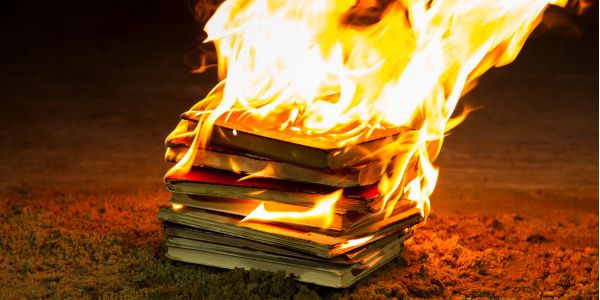Kenneth Baker’s book is far more satisfying. Lavishly illustrated, it is also riveting reading, with comprehensive detailed descriptions of some 90 burnings over a period of 500 years, from Savonarola’s Bonfire of the Vanities (1497), the depredations of Spanish conquistadores in America and Bishop Tunstall’s burning of Tyndale’s Bible in the 16th century, through the burning of Martin Luther’s works by order of the Edict of Worms (1521), the dubious achievements of the Papal Inquisition (1478-1834), and the burning of John Milton’s poetry and polemical works by Royalist decree in 1683, as well as those of Voltaire in Geneva in 1764, Lord Mansfield’s library during the Gordon Riots of 1780, H.G. Wells’ History of the World by Moslems in 1938, through the ignominious period of Nazi tyranny in Louvain (1940), Salerno (1943), Poland, Dieppe, and Minsk (all 1944) to Mao’s catastrophic Cultural Revolution of 1966-1976, during which millions died and the “Four Olds” (“old ideas, old customs, old habits, and old culture”) were to be mindlessly and ruthlessly extirpated. More recent book burnings have come about as a result of the fatwa against Salman Rushdie (1989), in addition to bonfires of books recorded in Iraq (2003), Cairo (2011), and Peshawar (2013). In addition to these conflagrations, the author details an astonishing number of book burnings planned or executed by their own authors, including Elizabeth Fry, Lord Tennyson, Thomas Hardy, Robert Browning, T.S. Eliot, and Ted Hughes, but also gratifyingly includes detailed references to books and manuscripts saved from the flames for posterity by family and friends of the would-be arsonists, but once again, I would have liked some insight into the collective mentality or individual minds of those who burn books…
Kenneth Baker’s style is lively, his arguments the result of careful painstaking research, and his uncompromising hostility to the fanaticism of book burners, whatever their beliefs, is evident throughout this fascinating study. His work is also marked by his deep respect for learning and for the preservation and celebration of the storied past of our linguistic and literary heritage as human beings, in all of the infinite variety of this inheritance.
From Ted Hughes’ poem Hear It Again, cited with approval by Kenneth Baker as a postscript to his book, comes the following:
Where any nation starts awake
Books are the memory. And it’s plain
Decay of libraries is like
Alzheimer’s in the nation’s brain
Even the most misfitting child
Who’s chanced upon the library’s worth,
Sits with the genius of the Earth
And turns the key to the whole world.
–Ted Hughes, (July 1997)





